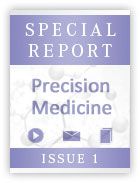Tool to Predict Late Recurrence of Breast Cancer Reduces Use of Adjuvant Therapy
A validated index for breast cancer that quantifies individual risk for late recurrence was associated with a substantial reduction in the use of adjuvant hormone therapy in a prospective study.
“Physicians typically recommend adjuvant hormonal therapy for most women with breast cancer, but a substantial proportion of women have a low risk for a recurrence and are unlikely to benefit,” explained Tara Sanft, MD, medical director of adult survivorship at the Yale Cancer Center Survivorship Clinic in New Haven, Connecticut. “We wanted to test the ability of this assay to alter treatment decisions in the context of its effect on patient satisfaction with the decision process.”
Information generated by the Breast Cancer Index (BCI), which is commercially available (bioTheranostics, San Diego, CA), led to a change in treatment decision in 27% of patients, according to data presented at the 2015 ASCO Annual Meeting. In most cases, the change was the decision to discontinue adjuvant hormonal therapy based on the evidence of a low risk of recurrence.
The study enrolled 100 women with stage I to III breast cancer, who had completed 3.5 years of endocrine therapy. Prior to performing the BCI assay, which yields a composite score for a patient’s risk of a late distant recurrence based on an algorithmic combination of molecular signaling pathways and gene mutations, patients and their physicians were asked to estimate their risk of recurrence. Patients also completed the State Trait Anxiety Inventory (STAI) and the Decisional Conflict Scale (DCS) prior and then again after the BCI assay results were available.
Most of the participants were white and postmenopausal. The median age was 60.5 years. More than 90% of patients had stage I (58%) or stage II (33%) cancers, and nearly 90% were HER2 negative. The majority of breast cancers at the time of diagnosis (65%) were 2 cm or smaller in size, with almost all of the rest no larger than 5 cm. Most women (70%) also had node-negative disease. Endocrine therapy at the time of testing was an aromatase inhibitor (66%) or tamoxifen (34%).
The objective assessment of recurrence risk provided by the BCI assay, which has been validated in a series of prospective, randomized trials, differed from both patient and physician estimates of risk. According to the BCI, 59% of patients were at low risk of a recurrence, 24% were at intermediate risk, and 17% were at high risk. Physician estimates for these risk categories were 49%, 33%, and 18%, respectively. The distribution of risks as estimated by patients, responding to terms “not at all likely,” “somewhat likely,” and “very likely,” were 24%, 71%, and 1%, respectively.
The large proportion of patients who placed themselves in the intermediate group is reflective of uncertainty that might drive a preference for treatment even when the likelihood of benefit is low. The advantage of the BCI, according to Sanft, is that it provides both an objective estimate of risk as well as an estimate of likelihood of benefit from extended adjuvant therapy. Together, these provide an important level of reassurance to both physicians and patients about how to proceed with treatment.
This reassurance was reflected by change in the STAI and DCS scores among patients before and after the BCI results were made available. According to Sanft, anxiety scores were reduced by 50% (P= .003) on STAI, while decisional conflict scores were reduced by 53% (P<.001) on DCS.
“Several studies have associated extended endocrine therapy with a reduced risk of breast cancer, but the absolute benefit is modest and extended treatment is not without toxicity,” Sanft reported. “These data suggest that BCI allows individualized treatment while reducing anxiety and improving patient satisfaction.”
Sanft TB, Aktas B, Schroeder B, et al. Prospective study of the decision-making impact of the breast cancer index in the selection of patients with ER+ breast cancer for extended endocrine therapy. Presented at the ASCO Annual Meeting: May 30, 2015. Abstract # 538.
<<<

Survivorship Care Promotes Evidence-Based Approaches for Quality of Life and Beyond
March 21st 2025Frank J. Penedo, PhD, explains the challenges of survivorship care for patients with cancer and how he implements programs to support patients’ emotional, physical, and practical needs.
Read More